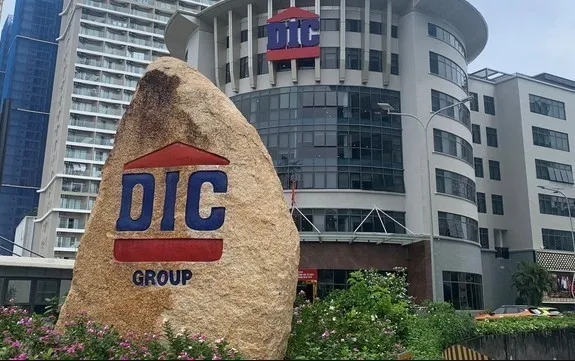
Severe Revenue Decline
DIG’s third-quarter performance underscores its ongoing difficulties. The company reported net revenue of just VND 47 billion, a staggering 80% drop compared to the same period in 2023. Pre-tax profit dipped into the red at negative VND 6 billion. Most alarming was the real estate segment, which posted a negative revenue of VND 65 billion. Other key segments also suffered sharp declines: service provision revenue fell to VND 35 billion (down 66%), while construction revenue plummeted to VND 44 billion (down 92%).
Cumulatively, for the first nine months of 2024, net revenue reached VND 682 billion, with after-tax profit standing at a mere VND 15 billion—achieving only 30% and 1% of the company’s full-year targets, respectively.
General Director Nguyễn Quang Tín attributed this dismal performance to declining revenues from core real estate activities, including apartment sales (SJC project), unfinished house transfers (Đại Phước and Hậu Giang), and land use rights (Nam Vĩnh Yên). However, all these revenue streams experienced sharp declines, leading to an overall slump.
One surprising detail in the financial report was the discrepancy between consolidated real estate revenue, which was negative VND 65 billion, and the parent company’s positive VND 77 billion from the same segment. According to DSC Securities, two factors explain this anomaly. First, intra-group transactions—where the parent sells assets to subsidiaries—are not recorded in consolidated reports. Second, revenues previously recorded had to be reversed due to products being deemed ineligible for handover following legal reviews.
DIG’s financial struggles are compounded by ongoing legal troubles. The company is under investigation for violations during its privatization process. Although preliminary conclusions and fines have been issued by the Government Inspectorate, the situation remains sensitive and poses a significant risk to DIG’s operational continuity.
The inspection revealed multiple irregularities, including failure to reassess the value of land use rights for 25 villas in the Phuong Nam project and for the Đại Phước project. Instead, DIG calculated these using a combination of investment costs and project development rights, which led to undervaluation of the company’s assets.
Adding to its woes, DIG recently lost its long-serving Chairman, Nguyễn Thiện Tuấn, who was widely regarded as the "soul" of the company. Tuấn had been a driving force behind DIG’s transformation from a state-run construction entity under the Ministry of Construction into a leading real estate developer with an expansive land bank.
His departure leaves a significant leadership void. According to DSC Securities, DIG will need substantial time to stabilize, including rebuilding its executive team and resolving its legal issues. Without these, the company is unlikely to experience the strong growth it once projected.
A Murky Future
DIG’s troubles have also rippled through the stock market. Following the Government Inspectorate’s announcement and the departure of its Chairman, DIG shares experienced a sell-off. Although the stock managed modest recoveries in subsequent sessions, these gains were short-lived, marking a sharp departure from its past performance.
Between 2021 and 2022, during a retail investor boom, DIG shares soared from VND 20,000 to over VND 100,000 by March 2022, marking the company’s most prosperous period. However, as the market cooled, DIG's stock value plummeted, losing nearly 90% of its peak value and approaching its par value of VND 10,000.
Currently, DIG shares hover around VND 20,000, down nearly 40% from VND 32,000 at the start of March. Despite this sharp drop, investors remain cautious and uninterested in "bottom fishing."
Investors’ skepticism is fueled not just by DIG’s current challenges but also by its track record of overpromising and underdelivering. At its 2024 Annual General Meeting, shareholders approved a business plan targeting VND 2,300 billion in revenue and VND 1,010 billion in pre-tax profit—representing year-over-year increases of 72% and 509%, respectively.
However, this is the third consecutive year DIG has set profit targets exceeding VND 1,000 billion, only to fall far short. In 2022, it aimed for VND 1,900 billion in profit but achieved just 10% of that goal. Similarly, in 2023, it set a profit target of VND 1,400 billion, managing only 12%.
Adding to the frustration, DIG has a history of publishing inconsistent financial figures, with significant discrepancies between its pre-audit and post-audit results.
DIG’s future remains clouded by uncertainty. The combination of legal and financial challenges, leadership instability, and repeated failures to meet targets has severely undermined investor confidence. While the company’s ambitious plans hint at potential recovery, past performance suggests that any turnaround will be slow and fraught with difficulty.
Until DIG can resolve its legal and leadership issues and demonstrate consistent financial performance, the likelihood of a significant breakthrough appears slim. For now, DIG serves as a cautionary tale about the risks of ambitious expansion without robust governance and sustainable practices.




















